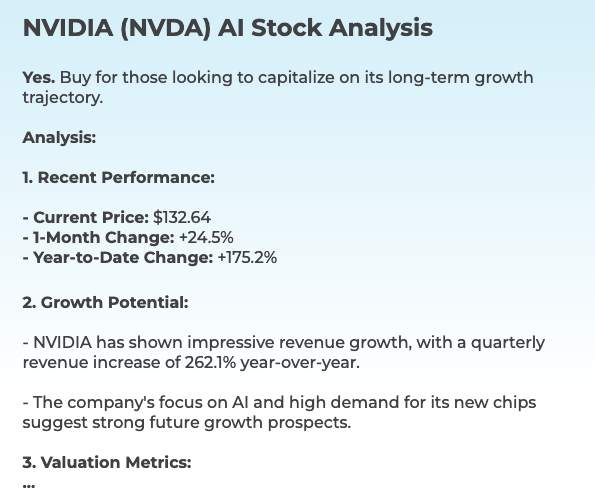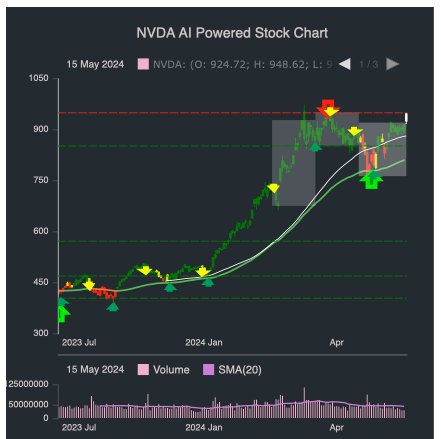20 Recommended Ways For Deciding On AI Stock Analysis Sites
20 Recommended Ways For Deciding On AI Stock Analysis Sites
Blog Article
Top 10 Ways To Evaluate Customer Support On Ai Stock Trading Platforms
Support for customers is essential when choosing the best AI platform for analyzing and predicting stocks. A prompt and reliable support staff will make all the difference in solving issues, maximizing platforms' usage, and ensuring the smoothest trading experience. Here are ten top tips to evaluate the customer support of these platforms.
1. Review Support Availability
24/7 support: Check if there is a platform that offers 24 hour assistance. This feature is particularly important for markets around the globe, and for trades that are real-time.
Business hours If you do not have 24/7 support, make sure that support is available for you during business hours.
Make sure there is support available on weekends, holidays or when markets are closed.
2. Test Response Times
Initial response. Contact customer support and ask them a sample question to see how quickly they can respond.
Resolution time: Decide the time frame you will need to resolve issues until they are solved, and don't simply admit their existence.
Live chat: If live chat is available test the responsiveness and efficiency.
3. Examine the support channels
Multiple channels: Ensure that the platform has support available via various channels (e.g., telephone, email or live chat, as well as social media).
The preferred channel: Make sure that your preferred support channel (e.g. phone, email or chat) is accessible and reliable.
Self-service solutions: For speedy problem solving, look for comprehensive knowledge bases, FAQs and community forums.
4. Examine Support Qualities
Support agents must be well-informed about trading platforms, technical issues, and platforms.
Problem-solving: Assess whether the support agent can resolve complicated issues effectively, or escalate them appropriately.
Professionalism. Check that support interactions were friendly, professional and helpful.
5. Check for Account Managers
Premium support: Find out whether you have account managers for higher-tiered users or institutions.
Account managers who offer an efficient and customized service.
Relationship Building: Ensure that the account managers you collaborate with are available at all times. You can also develop relationships over time.
Review Documentation
Knowledge base: Ensure that the website has a searchable and well-organized knowledge base with tutorials, guides, and troubleshooting tips.
Video tutorials: See whether the platform has videos or webinars to help visual learners.
API documentation. If you're a programmer, check if the platform provides clear and clear API documentation.
7. Examining Peer and Community Support
Forums for users. Find out if your platform hosts a forum or user community where you can find helpful tips and tricks.
Find social media forums that aren't official (e.g. Reddit or Facebook). These groups allow users to talk about the platform.
Community engagement: See if the team of your platform is actively involved in discussions or forums in the community.
8. Evaluate Escalation Processes
Issue escalation: Make sure there's an established procedure for escalating problems that haven't been resolved to management or support at a higher level.
Follow-up: See if support follows up after the resolution of an issue to confirm that the issue is resolved.
Feedback loop: Verify whether the platform gathers user feedback to improve support service.
9. Test Support in Critical Conditions
Contact Customer Support during times of high-volatility to see how they respond.
Technical issues: You can simulate a technical problem (e.g. login issues or data differences) to see the support team's response.
Trade execution: See whether you can receive support for urgent issues related to trading (e.g. unsuccessful orders, delays in execution).
Look at the User Reviews
Reviews on the internet: Look up reviews from users on platforms like copyright, G2, or Reddit to determine the overall satisfaction with customer service.
Testimonials: Search for testimonials or case studies highlighting positive support experiences.
Find out how the platform responds to negative feedback and complaints.
Bonus Tips
Support during the trial period: To evaluate the reliability of the system, you are able to test the support of the platform during a free trial period.
Support for languages. If you do not speak English ensure you verify that support is available in the language of your choice.
Training and Onboarding: Check whether the platform offers training or onboarding sessions to help new users starting out.
Check these points to determine the level of customer service offered by AI stock trading platforms. Choose a platform offering reliable, helpful and quick assistance. A strong customer service can improve your overall experience and enable you to make the most of the platform's features. Check out the recommended https://www.inciteai.com/trader for site advice including ai for stock trading, best AI stock, chart ai trading assistant, ai chart analysis, best AI stock trading bot free, stock ai, incite, ai for trading, best AI stock trading bot free, best ai for trading and more.
Top 10 Tips To Assess The Regulatory Compliance Of AI stock For Predicting Or Analyzing Platforms
When it comes to evaluating AI trading platforms, compliance with regulatory requirements is critical. Compliance ensures that the platform operates within the legal frameworks, safeguards user data, and adheres to financial regulations, reducing the chance of legal issues or financial sanctions. These are the top 10 guidelines for assessing the regulatory compliance of these platforms:
1. Verify License and Registration
Regulatory Authorities: Make sure that the platform registered with the relevant regulatory authorities (e.g. SEC US, FCA UK and ASIC Australia) and has an appropriate license.
Verify the broker partnership. If the platform incorporates brokers, be sure that they are properly licensed and monitored.
Public records: You can check the website of the regulator to determine whether the platform has been registered and if there has had any violations over the years.
2. Measure Data Privacy Compliance
GDPR: If you operate or serving users within the EU Make sure that the platform meets the requirements of the General Data Protection Regulation (GDPR).
CCPA: California Consumer Privacy Act compliance is required for users.
Data handling Policies: Read the policy of the platform's privacy and data security to ensure that it outlines exactly the way that user data is stored, used and shared.
3. Examining anti-money laundering measures
AML Policies: The platform should have solid AML (Anti-Money Laundering) policies to identify the money laundering process and stop it.
KYC Procedures: Verify whether there are procedures on the platform to verify users' identities.
Monitoring transactions: Find out if the platform can monitor transactions and reporting any suspicious activity to the appropriate authorities.
4. Verify that you are in compliance with Trading Regulations
Market manipulation: Be sure that your platform has safeguards in place to stop market manipulations, such as fake trading and wash trading.
Order types: Verify if the platform is in compliance with rules regarding types of orders (e.g. there is no unlawful stop-loss hunting).
Best execution: Make sure to determine if the platform is adhering to the best execution method, which ensures that trades are executed at the cheapest cost.
5. Cybersecurity Assessment
Data encryption - Ensure that the platform uses encryption to safeguard data either in transit or when it is at rest.
Response to incidents. Verify that there is a clearly defined incident response strategy on the platform to deal with cyberattacks as well as data breaches.
Check for any certifications.
6. Transparency and Disclosure A Study
Fee disclosure: Make sure the website discloses all fees that are hidden, as well as any additional fees.
Risk disclosure: Check if the platform has explicit risks disclosures. Particularly for high-risk and leveraged trading strategies.
Performance reports - Check to see if there are precise and transparent reports on performance made available by the platform to its AI models.
7. Verify the conformity to International Regulations
Cross-border Trading: If you're trading is international You must ensure that the platform meets all regulatory requirements in each country.
Tax reporting: Check whether the platform has tools or reports to help users adhere to tax regulations.
Compliance with sanctions: Verify that the platform is in compliance with sanctions and is not allowing trading or dealings with countries or entities that are banned.
8. Review the record-keeping process and audit trails
Transaction records: Make sure your platform has detailed records of every transaction for reasons of auditing and regulatory purposes.
Logs of activity for users (logs): Check to determine if the platform is tracking user activity such as transactions and logins. Also, check if the settings for your account have been modified.
Audit readiness: Ensure that the platform is able to provide all documentation and logs if the need for a regulatory audit arises.
9. Verify compliance with AI-specific regulations.
Algorithmic Trading Rules: If your platform supports trading using algorithms, ensure that it adheres to regulations such as MiFID II (in Europe) or Reg SCI (in the U.S.).
Fairness and bias: Check whether the platform is able to monitor and reduces biases in its AI models to ensure ethical and fair trading.
Explainability: In accordance with certain regulations, the platform should be able to provide clear explanations for AI-driven predictions and decisions.
Review User Feedback and Regulatory History
Reviews from users: Perform research to evaluate the reputation of the platform regarding legal conformance.
Regulatory history: Check whether the platform has a records of violations to the law such as fines, penalties, or sanctions.
Third-party inspections: Check if the platform is subjected to regular third-party inspections to ensure the platform's compliance.
Bonus Tips
Legal consultation: Talk to an expert on the subject to check whether your website is in compliance with the regulations.
Trial period: Try the demo or trial version for free to evaluate the platform's conformity features and documentation.
Customer support - Make sure that the platform is able to help with any compliance related concerns or questions.
With these guidelines you can assess the degree of compliance with the law between AI stock trading platforms. This will enable you to choose a platform that is operating within the legal framework that will protect your interests. The compliance reduces legal risk and improves confidence on the platform. Take a look at the top investing with ai url for site advice including ai in stock market, AI stock price prediction, best AI stocks, chart ai trading, investing with ai, best ai for stock trading, stock trading ai, best AI stocks to buy now, best ai trading platform, free AI stock picker and more.